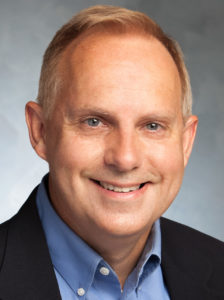Over the past month, I’ve had the great gift and responsibility of traveling the country talking to primarily white Christians about racism in the church and in America.
At Trinity Church, Wall Street, America’s wealthiest congregation, I shared some of my ongoing research into racial mythologies and how they damage both the people against whom they are weaponized and the people who deploy them.
At St. Paul’s Episcopal Church in Chestnut Hill, a suburb of Philadelphia, we screened Raoul Peck’s Academy Award-nominated documentary I Am Not Your Negro and talked about how the life and work of James Baldwin helped illuminate American history and our ongoing struggle for justice and freedom.

Greg Garrett
And at a retreat center in Washington, with the Olympic Mountains sometimes peeking through fog and clouds to our west, I led a conversation with clergy about Jemar Tisby’s The Color of Compromise: The Truth about the American Church’s Complicity in Racism, Kelly Brown Douglas’ essential new book Resurrection Hope: A Future Where Black Lives Matter, and next steps for white Christians.
We framed that last weekend of conversation in Washington State as an engagement with liberation theology, particularly with Black liberation theology, and of our need to understand how Christians of different lived experiences have needed different experiences of God — of how, for example, Black Christians might respond to an oppressive and oppressing “white Jesus” by a desire for a Black Jesus who knows and understands their struggles and heartbreak.
Liberation theology, we said, is contextual, shaped by a particular people’s particular needs, so we spoke also of why so many Christians have had to wrestle for a usable Christian faith and practice because of their racial location.
One of these good clergy people in Washington — and I say “good” because it has been my experience that white people do not show up for a program or retreat to explore how they might help themselves and the world become less racist because it is a rocking good time — advanced an idea I thought about then and am continuing to think about.
“It feels to me,” he said, “that white people need a theology of liberation as well.”
“White Christians badly need a theology that might help liberate us from 400 years of American racism and help us lean into the hard work of racial repair, no matter what it costs us.”
In a world chockful of white privilege and “All Lives Matter,” a world where a book called White Fragility could be a bestseller, it would be easy to misunderstand this comment as a defensive complaint about where white people are on the question of race, but I knew that was not what this Episcopal clergyman meant, since I had introduced the weekend with challenging opening words from Jarel Robinson-Brown’s Black, Gay, British, Christian, Queer: The Church and the Famine of Grace (“Am I loved? Do I have worth? Is my life worth living? These three questions are things that no human being should have to truly contemplate”), since we had been talking all weekend about how, as Kelly Brown Douglas puts it in Resurrection Hope, unexamined whiteness is soul killing.
What he meant, and as the nods of his primarily white colleagues around the room testified, was that white Christians badly need a theology that might help liberate us from 400 years of American racism and help us lean into the hard work of racial repair, no matter what it costs us.
Prior to her appearance at a Baylor University event on racism and the white church, I had the chance to talk with Catherine Meeks of the Absalom Jones Episcopal Center for Racial Healing, one of my guiding lights in this work. Meeks was telling me — as she later mentioned in her Baylor keynote address — that she is currently leaning into the work of repairing racialized trauma. Knowing that she has done a substantial amount of research and writing on lynching, I understood that she often is talking with Black people about the ongoing trauma of that violence, and I thanked her for doing that important work.
But, in her knowing and loving way, she stopped me almost mid-sentence. “Greg,” she said, “you are also carrying racialized trauma that is damaging you. All of us do.”
“Just when I think I’m getting a handle on this work, I am always reminded of something I should know.”
And I had to stop and smile ruefully, because just when I think I’m getting a handle on this work, I am always reminded of something I should know. Yes, of course, as a white person, I have been badly misshaped by growing up in a system that devalues other children of God, by walking through a world where even if it is not a conscious part of my awareness, I receive innumerable benefits simply for waking up white.
I also say I should have known this, because in each of these speaking occasions over the past month — as I do in all of the places where I speak, teach or preach — I carried a lesson from James Baldwin about the need for white people to be liberated from our own history of hatred and violence and privilege. In the opening letter from The Fire Next Time, Baldwin tells his nephew that it does not matter if white people ever accept him:
The terrible thing, old buddy, is that you must accept them. And I mean that very seriously. You must accept them and accept them with love. For these innocent people have no other hope. They are, in effect, still trapped in a history which they do not understand; and until they understand it, they cannot be released from it. They have had to believe for many years, and for innumerable reasons, that Black men are inferior to white men. Many of them, indeed, know better, but, as you will discover, people find it very difficult to act on what they know. To act is to be committed, and to be committed is to be in danger.
In my Sunday sermon in Philadelphia, I quoted Henri Nouwen, who said that one of the reasons we do not open ourselves to God’s bidding is that if we knew what God wanted us to do, we would have to admit that we are supposed to do it.
I do not yet know precisely what it would look like to build a theology that liberates people who look like me from 400 years of oppressing and suppressing, but that is my ongoing work as a person of faith, as I know it is for many of you.
And I suspect after this good hard month of speaking and listening, that a white theology of liberation will ultimately look like this: Tell the truth. The whole truth. Accept responsibility for that truth. Repent of it. And in response to that recognition, commit to love, sacrificially, completely, in such radical fashion that the world cannot help but see that we are truly followers of the One who came to reconcile.
Greg Garrett is an award-winning professor at Baylor University. One of America’s leading voices on religion and culture, he is the author of more than two dozen books, most recently In Conversation: Rowan Williams and Greg Garrett and A Long, Long Way: Hollywood’s Unfinished Journey from Racism to Reconciliation. He is currently administering a research grant on racism from the Eula Mae and John Baugh Foundation and writing a book on racial mythologies for Oxford University Press. Greg is a seminary-trained lay preacher in the Episcopal Church and canon theologian at the American Cathedral of the Holy Trinity in Paris. He lives in Austin with his wife, Jeanie, and their two daughters.
Related articles:
Faithful discomfort: Why white Americans need to be offended | Opinion by Greg Garrett
Christian masculinity, culture and racism: An interview with Kristin Du Mez | Analysis by Greg Garrett


